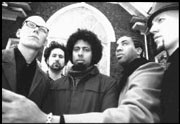MAKTUB, ORBITER, AND THE HELIO SEQUENCE
Showbox, 628-3151, $10 adv. / $12 8 p.m. Fri., April 19
BACK IN 1995, Kevin Goldman, Davis Martin, and Reggie Watts started Maktub (pronounced “mock tube”) with the idea that a hip-hop- and funk-based improvisational group was just what this typically rock-oriented city was lacking. Seven years— and two more members, Dan Spills and Thaddeus Turner—later, Maktub has emerged as the driving force behind our town’s burgeoning improv hip-hop/R&B/ dance/ electronic scene. Where they were once strictly free-form, the band now have actual songs, but the improv ethic still permeates the band’s identity. After some seemingly promising major-label interest, the band finally chose the more challenging route of putting out their album without the backing of an established label. Their recently released second album, Khronos, is an ambitious effort to make a name for themselves by themselves.
Seattle Weekly: How has your music evolved from the days when you were doing pure improv at places like the Owl and Thistle? Have you seen Seattle’s improv/R&B scene evolve along with your band?
Dan Spills: That’s kind of a social musical occurrence that has evolved in Seattle in, let’s say, the last five years. Maktub is a smaller subset of that, and we’re actually something that exists outside of it. We’re a band that has actual compositions and plays larger shows. Our members just happen to be a part of this larger musical community that shifts and changes musicians and creates music on the fly.
Reggie Watts: It’s all so you can dance. But that music and that experience had a huge influence on how we write. We’re even tempted for our next record, or next whatever that project is, to just do it on the fly in the studio with a good producer. I think that, at least in theory, is where the most creativity is going to come out.
Do most of your songs still evolve from jam sessions?
D.S.: More often than not, somebody will come in with some kind of texture, and that’s either a guitar riff, or being a keyboardist, I will come in with chords. Also, Reggie, being a keyboardist and vocalist, will come in with chords and a melody and just say, “drop it on the crowd.” It gets dropped, and the song gets written within minutes. Ninety percent of it is just done immediately, and the other 10 percent [is] just little nuances. Unlike other bands where people like Reggie, Thaddeus, and I would write 80 percent of the songs and then bring them into the band—which is traditionally how most bands work—this band doesn’t create without jam nights or that same ethic in the rehearsal space.
With such an organically based musical approach, do you foresee Maktub continuing as a self- run entity?
D.S.: I think so. To understand the full scope of putting out an album, from studio time to costs to working with producers and executive producers, having that knowledge under your belt is always a good thing. If we ever enter into another arrangement with a label or something, we would know from soup to nuts what is going on.
R.W.: Nowadays it’s just safer to do things by yourself as much as you can before you enter into another arrangement. It’s just smarter. [With record labels] it’s a relationship thing. It’s like there’s someone you’re interested in and you’re hanging out with him or her, and they’re being aloof. They kind of want to be with you, but you’re not sure, so after a while you just decide that, “Hey, I’m going to go back to doing my thing.” People see things in the band, and they’re generally interested, and yet they’re not quite sure how to do it because Maktub is not a sound that is going to be bankable right away.
D.S.: Three sushi dinners into it, you get to the point where you are like, “This has been great talking, and I appreciate you buying me more sushi, but I have to record an album now. I don’t have time to keep flying down here for sushi dinners.”




